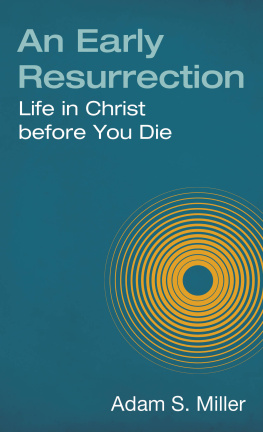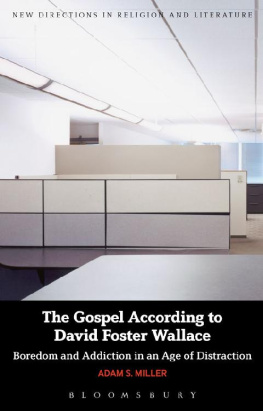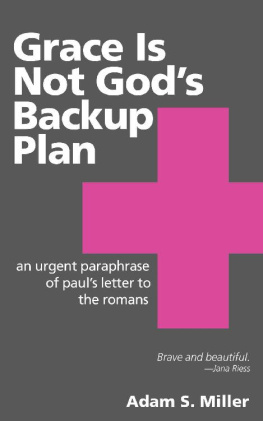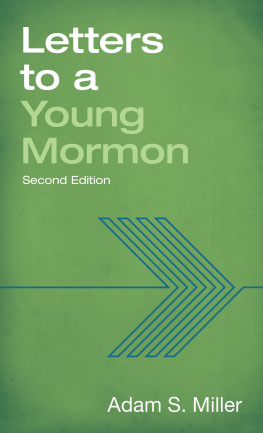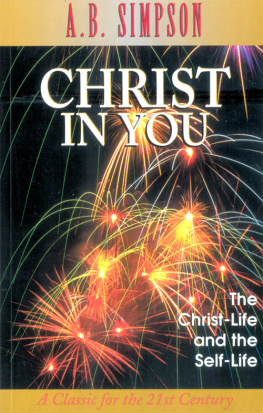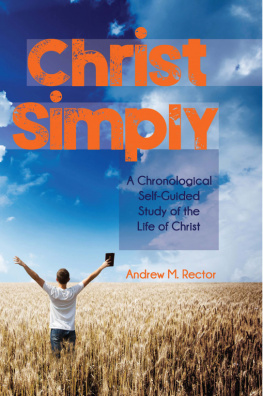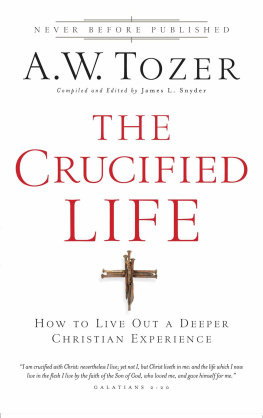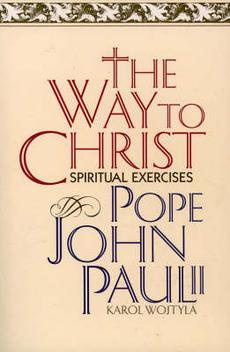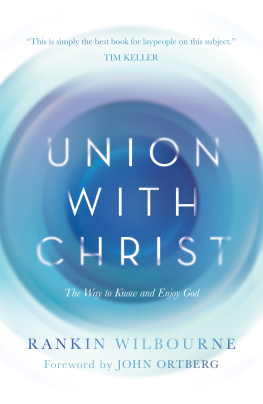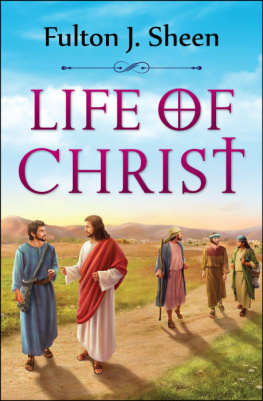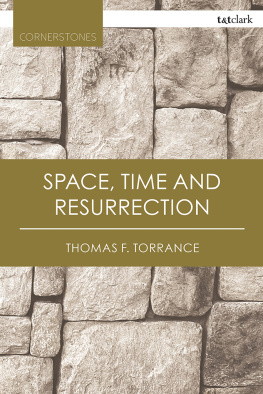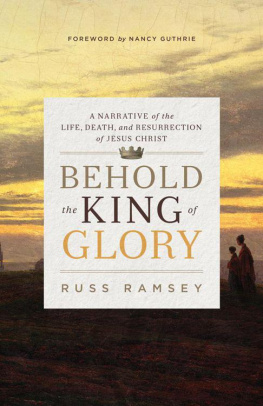Adam Miller has put pen to paper (or finger to keypad) and struck again. In this rather remarkable little book, he invites readers to contemplate the beauty and blessing of living a life that is in Christ, an expression the apostle Paul utilizes over 150 times in his epistles. Miller focuses on how members of the body of Christ may prepare best for a glorious future hereafter through experiencing an early resurrection here , in the present. Reflecting on the message of this book carefully will motivate readers to look upon the gift of time much more carefully and certainly with new eyes. Within this volume is to be found a distinctive but profound new look at the Saviors atonement, a gentle but persuasive prod into the quality of life, the abundant life, that God desires for all of His children. This is a book that can adjust your perspective and thereby change your life.
Robert L. Millet
Professor Emeritus of Ancient Scripture
Brigham Young University
When a prophets trust in Gods future promise was so sure that he lived as if it had already been fulfilled, a special Hebrew verb tense known as the prophetic perfect was used. Adam Miller articulates that experience for us, then shows us how to get there. In Christ, we can both release our grip on our time-bound fears and enter the present more deeply.
Wendy Ulrich
author of Let God Love You
An Early Resurrection is two things: the candid report of an ardent soul on its quest for redemption, and the reflections of a philosopher on the gospel and time. It will appeal to readers who manage their religious struggles by thinking, as Adam Miller does so productively.
Richard Lyman Bushman
author of Joseph Smith: Rough Stone Rolling
You will look at the world differently after reading this book. An Early Resurrection will help you see many things in a new light: the Book of Mormon, Pauls New Testament writings, gospel ordinances, people you meet, your stress over too many deadlines, and time itself ( especially time itself). Millers book offers a deeper understanding of what it means to be alive in Christ now , in the present . And youll care for, and care about, the present in a way that can only come with being alive.
J.B. Haws
Assistant Professor of Church History and Doctrine
Brigham Young University
This is a book about timeparticularly Christs ability to defy, fold, and reorder time for our benefit. In a wonderfully fresh, thought-provoking approach, Adam Miller effectively challenges readers to live today as though Christs promises were already realities. Because they are. An ideal read for anyone seeking the authentic lifea life in Christ.
Camille Fronk Olson
Professor of Ancient Scripture
Brigham Young University
Book design Deseret Book
Cover illustration RFV/Shutterstock.com
Art direction: Richard Erickson
Design: Heather G. Ward
2018 Adam S. Miller
All rights reserved. No part of this book may be reproduced in any form or by any means without permission in writing from the publisher, Deseret Book Company, at permissions@deseretbook.com or PO Box 30178, Salt Lake City, Utah 84130. This work is not an official publication of The Church of Jesus Christ of Latter-day Saints. The views expressed herein are the responsibility of the author and do not necessarily represent the position of the Church or of Deseret Book Company.
Deseret Book is a registered trademark of Deseret Book Company.
Visit us at DeseretBook.com
Library of Congress Cataloging-in-Publication Data
Names: Miller, Adam S., author.
Title: An early resurrection : life in Christ before you die / Adam S. Miller.
Description: Salt Lake City, Utah : Deseret Book, [2018] | Includes bibliographical references.
Identifiers: LCCN 2017059813 | ISBN 9781629723686 (paperbound)
Subjects: LCSH: Christian lifeMormon authors. | The Church of Jesus Christ of Latter-day SaintsDoctrines. | Mormon Church
Doctrines.
Classification: LCC BX8656 .M524 2018 | DDC 248.4/89332dc23
LC record available at https://lccn.loc.gov/2017059813
Printed in the United States of America
LSC Communications, Crawfordsville, IN
10 9 8 7 6 5 4 3 2 1
For Stan Hall
Preface
This isnt an ordinary church book. My day job as a philosophy professor is to blame.
Every day I get up and go to work and spend my time thinking about the kinds of things that most people take for granted. While its normal to ask if some particular thing is real or true or good, my job is to ask what it means for something to be real or true or good in the first place. While its normal to ask if some particular thing exists, my job is to ask instead about what it means to exist at all. And while its normal to ask what time of day it is, my job is to ask about time itself. As a philosopher, I ask, What is time, anyway?
These are hard questions. Theyre slippery and abstract. They gum up our routines. Theyre not very practical.
But, still, living with these questions has changed me in practical ways. Working with them every day, theyve bled back into my everyday life. Theyve come to color even my ordinary decisions as they show me new ways to think about my life and my religion.
This book, An Early Resurrection , is one example of how my work in philosophy has come to color my everyday life. For years now Ive been focused on scholarly projects that ask about the nature of time, and this work has, especially, changed how I think about Christ. The more Ive thought about time, the more Ive come to think about Christs atonement in terms of time. Ive come to think about the atonement in terms of how Christ solves the problem of time, in terms of how he redeems time, and in terms of how he reorders my experience of time.
When Nicodemus comes to Jesus at night, Christ tells him that except a man be born again, he cannot see the kingdom of God (John 3:3). Nicodemus isnt sure what this means. He cant see how a grown man could, in the middle of life, go back to the beginning and start over. How can a man be born when he is old? can he enter the second time into his mothers womb, and be born? (John 3:4). This is, I think, a serious question. Nicodemus is asking a question about time.
In our ordinary experience of time, beginnings only come at the beginning and ends only come at the end. But Christ is promising something else. The beginning, he promises, can come again. The beginning can come in the middle. Even in the middle of life, we can be born again and begin a new life. Marvel not that I said unto thee, Ye must be born again. The wind bloweth where it listeth, and thou hearest the sound thereof, but canst not tell whence it cometh, and whither it goeth: so is every one that is born of the Spirit (John 3:78). Those who are born of the Spirit are mysterious to outsiders in exactly this way. Their lives dont follow times normal rules. Things happen out of order for them. Theyre like the wind. When they pass your way, you can feel that something is happening with them, but you cant tell where they started or where theyre going.
The apostle Paul plays with this same idea. However, instead of talking about Christs work of redeeming time in terms of a late (or second) birth, he describes it as a kind of early resurrection that gets underway even before we die (cf. Galatians 2:1920). In either case, though, the basic idea is the same. When I start a new life in Christ, Christ reorders my experience of time. The beginning comes in the middle, the end comes before the beginning, and the ordinary stuff of life is saved as we live it.
This whole book is a meditation on just this one idea: the idea that starting a new life in Christ can be described as an early resurrection and that this kind of early resurrection is intended to save both my future and my present. Following this thread, Ill look at how Paul defines a life in Christ, how ordinances function as types of Christ, how Christ uses types to reorder our experience of time and fulfill Gods law, how people in the Book of Mormon managed to live as though Christ had already come long before he was born, how sacred covenants fold the future into the present, and how the temple itself bends time in order to seal generations of parents and children into a single family.

